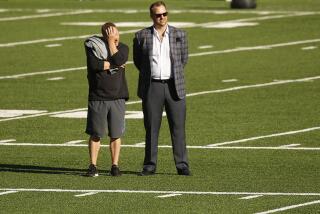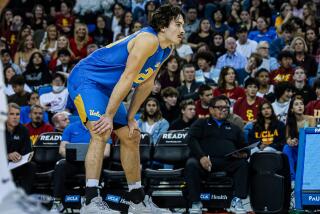Champing at Bit to Resume Horse Racing in Iraq
The jockeys’ racing silks were looted and the betting windows broken. A promising 3-year-old racehorse suffered a nasty shrapnel wound. Unexploded mortar shells littered the ground near the racing oval. Thieves even stole the wheels off the starting gate.
In spite of it all, Baghdad’s racetrack may be back in business soon, providing what would be for some a welcome diversion from the trials of daily life in the Iraqi capital.
“The beginning of June, God willing,” said racing manager Abdul Ali Tahi, who has been firing the starting gun at the track since 1968. “It’s part of our tradition.”
Fine horseflesh occupies a particular place of pride in Iraqi culture. Though its precise origins are contested, the Arabian horse -- the swift and elegant breed from which most of the world’s thoroughbred racehorses are descended -- may have its ancestral roots in a swath of present-day Iraq, zoologists say.
Such is the Iraqi passion for the sport that the track, just west of the capital in the suburb of Abu Ghraib, continued to operate until April 2, nearly two weeks into the war. Even then, it drew crowds of up to several thousand.
“With jet fighters in the sky, with bombs falling, people came,” Tahi said. “So I think that even with all the hardships now, they will come again.”
Much work remains to be done before that can happen. The jockeys’ weigh-in station was vandalized and the scales stolen. For the moment, there’s no such thing as a photo finish: The mounted video cameras were looted. The track’s safe was ransacked and betting slips scattered.
But the track’s surface is unmarred and the spectator stands are intact. The banks of high floodlights lining the oval, apparently out of thieves’ reach, went untouched -- though there is no electricity to power them, because the track’s generator was stolen.
American soldiers from the 2nd Battalion, 70th Armored Regiment, based in Ft. Riley, Kan., have set up camp at the site, with an assemblage of tanks and armored personnel carriers filling the main parking lot. They are there mainly to provide security, said their commander, Lt. Derek Drummond.
“At some point, when they’re ready to provide that for themselves, I expect we’ll get our orders to leave,” he said.
Soon after the U.S. troops arrived, they were approached by a delegation from the Iraqi Horse Breeders Assn., which explained that the horses and grounds were in need of care. The owners were allowed to reclaim their battered clubhouse, and grooms and stable hands went back to work.
By that time, the Americans had already swept the track and its environs for unexploded ordnance and disposed of stacks of Iraqi mortar shells abandoned near the area.
The twisted, charred remnants of antiaircraft guns, which apparently had taken direct hits in the U.S. air raids, still litter an open field near the track’s outer gate.
Several hundred racehorses remained on site throughout the war, with a few stable hands watching over them.
“I couldn’t leave them; I love them,” said groom Faris Janabi, who stayed with the dozen horses in his stable. “They neighed and reared when the bombs fell nearby, and I felt their fear. I tried to calm them so they would not hurt themselves.”
In a brick stall, a chestnut stallion stamped his hoofs and tossed his mane to drive away the flies buzzing around a bloodstained bandage on his right foreleg. Janabi said he wanted to make a poultice for the wound, which he said was caused by shrapnel, but that his veterinary supplies had been stolen.
In general, though, the stables fared better than the track and clubhouse. Most of the tack, including expensive specialty saddles, was safely hidden away and went undiscovered by looters. Bombs shattered the windows of outbuildings, the stable hands said, but did no serious damage.
Despite summertime temperatures that soar to 120 degrees, the track traditionally operates year-round, with thrice-weekly races. From July to September, the races are run at night, and the horses are exercised only in the cool of the early morning.
Even before it reopens, the 80-year-old equestrian club faces political fallout from the toppling of Saddam Hussein.
The Iraqi leader’s eldest son, Uday, had his own private track and stables, so he rarely made an appearance. “Thank God for that,” said Salem Abdul Obeidi, a retired army officer who serves as an advisor to the club.
But some of Uday Hussein’s associates, who were known for fixing races and threatening jockeys, remain members of the club. Early this month, a loud shouting match broke out among the owners about whether anyone with ties to the younger Hussein should be expelled.
Betting on horses was not illegal under Saddam Hussein’s rule, and track officials said they expected it would remain permissible under the interim government. But a few owners, who did not want to be publicly identified, said they were worried that Shiite Muslim leaders eventually might seek to enforce Islamic prohibitions on gambling.
Track officials said they were awaiting formal permission from the Americans to restart the races, and in the meantime will continue to clean up the grounds and replace equipment.
Janabi, the groom, said he believed the horses were missing their racing routine.
“Before, even when they themselves were not running, they would become very alert when they heard the starting gun and the sound of the crowd,” he said. “I think they want to run.”
Asked whether his soldiers might enjoy the spectacle of a horse race, Drummond, the U.S. Army lieutenant, gazed out at the barren, heat-shimmered landscape surrounding the track.
“At this point,” he said, “I believe they’d enjoy just about anything.”
More to Read
Get our high school sports newsletter
Prep Rally is devoted to the SoCal high school sports experience, bringing you scores, stories and a behind-the-scenes look at what makes prep sports so popular.
You may occasionally receive promotional content from the Los Angeles Times.






